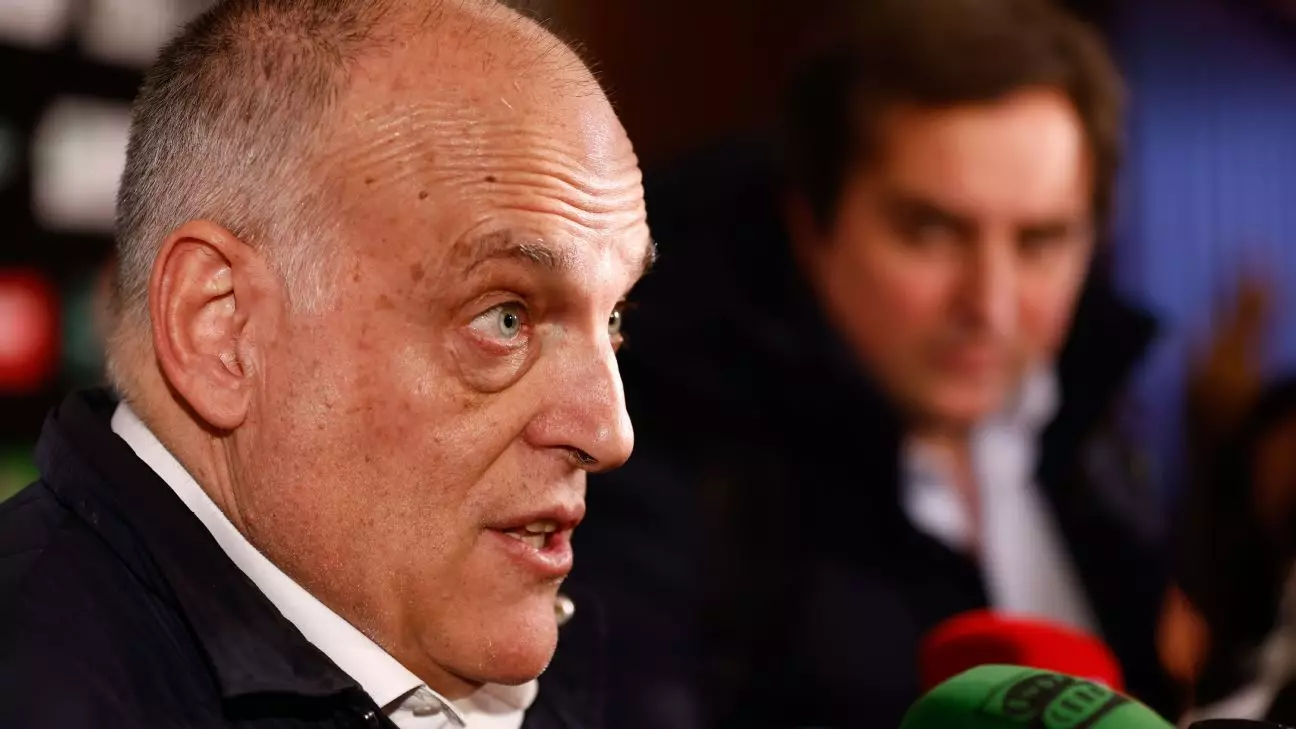The relationship between clubs and league authorities often teeters on the edge of trust and tension, and nowhere is this more evident than in Spain’s illustrious football league—LaLiga. Recently, a fervent dispute has emerged, pitting Real Madrid against LaLiga President Javier Tebas, who has accused the club of fostering groundless claims of victimization against referees. This article will dissect the unfolding saga and explore the implications for club loyalty, officiating integrity, and the reputation of LaLiga itself.
Javier Tebas has not held back in voicing his discontent with Real Madrid’s repeated accusations regarding officiating. The term “crying” resonates deeply, suggesting that the powerful Madrid side is leaning towards melodrama rather than constructive discourse. For a club with such a rich history, the portrayal as a helpless victim creates a jarring contrast to its competitive ethos. Observers are compelled to question whether these rants stem from genuine grievances or if they are merely a strategic plea to garner sympathy from fans and media alike.
Madrid often utilizes its official communication channels to elaborate on perceived officiating injustices. Indeed, the prevalence of these complaints raises an essential point about accountability in sports governance. By framing the narrative as a “global conspiracy,” the club risks diminishing the legitimacy of their legitimate concerns and inadvertently undermining respect for the league’s refereeing standards. This complex narrative can degrade into a dangerous rabbit hole where grievances overshadow the essence of the beautiful game.
Javier Tebas has charged that such accusations not only insult LaLiga’s integrity but also harm the reputation of other clubs in the league. In his view, undue focus on conspiracies threatens to distort the competitive environment that should ideally exist in any championship. On this front, he argues that maintaining a level playing field is paramount.
Real Madrid’s open letter to the Royal Spanish Football Federation (RFEF) accused officials of “manipulation and adulteration” of competition—a bold assertion that has raised eyebrows among football analysts and fans alike. A possible overreach in rhetoric, esports enthusiasts argue, might indeed reflect more on the strategic stances of external influences within various clubs rather than the intrinsic qualities of the refereeing body.
Teasing out the ramifications of these actions highlights a delicate balance between upholding individual club interests and preserving the sanctity of competition itself. Undoubtedly, constant allegations could lead to a fractious atmosphere, one that could negatively impact player performance and spectator enjoyment.
Tebas has made it clear that he will not entertain these baseless claims without consequence. By defending LaLiga’s position to report Real Madrid’s complaints to the disciplinary committee of the RFEF, he seems willing to take a stand against what he perceives as threats to fair competition integrity. His observation that such accusations do “a lot of damage to the competition” cannot be dismissed lightly, given the potential repercussions for both league officials and clubs alike.
Of particular note is the situation surrounding Dani Olmo, whose registration issues with Barcelona exemplify the complexities surrounding financial regulations in LaLiga. This case further amplifies the ongoing discussion about compliance and the need for robust governance to ensure fair play for all participating clubs. With Olmo reinstated due to an appeal, many eyes are on LaLiga as it navigates through intricate legal frameworks while striving to uphold its tenets.
The backdrop of Real Madrid’s complaints and Javier Tebas’s rebuttals speaks volumes about the current climate in LaLiga. As the league grapples with the reverberations of these disputes, fans, players, and clubs must remember the objective of sport: unity, competition, and fair play.
As controversies swirl, it becomes essential for stakeholders to engage in dialogues that prioritize constructive solutions rather than perpetuating a cycle of blame. After all, the integrity of football is anchored in mutual respect and the recognition that, while officiating can be flawed, the beauty of the game lies in its unpredictability and drama—qualities that should never be reduced to mere conspiratorial antics.

